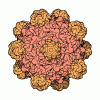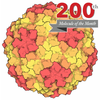+ Open data
Open data
- Basic information
Basic information
| Entry | Database: PDB / ID: 7wqo | |||||||||||||||||||||||||||
|---|---|---|---|---|---|---|---|---|---|---|---|---|---|---|---|---|---|---|---|---|---|---|---|---|---|---|---|---|
| Title | Structure of Adeno-associated virus serotype PHP.eB | |||||||||||||||||||||||||||
 Components Components | Capsid protein VP1 | |||||||||||||||||||||||||||
 Keywords Keywords | VIRUS / Adeno-associated virus | |||||||||||||||||||||||||||
| Function / homology | Phospholipase A2-like domain / Phospholipase A2-like domain / Parvovirus coat protein VP2 / Parvovirus coat protein VP1/VP2 / Parvovirus coat protein VP1/VP2 / Capsid/spike protein, ssDNA virus / T=1 icosahedral viral capsid / structural molecule activity / Capsid protein VP1 Function and homology information Function and homology information | |||||||||||||||||||||||||||
| Biological species |   Adeno-associated virus 9 Adeno-associated virus 9 | |||||||||||||||||||||||||||
| Method | ELECTRON MICROSCOPY / single particle reconstruction / cryo EM / Resolution: 2.85 Å | |||||||||||||||||||||||||||
 Authors Authors | Xu, G. / Lou, Z. | |||||||||||||||||||||||||||
| Funding support | 1items
| |||||||||||||||||||||||||||
 Citation Citation |  Journal: Mol Ther Methods Clin Dev / Year: 2022 Journal: Mol Ther Methods Clin Dev / Year: 2022Title: Structural basis for the neurotropic AAV9 and the engineered AAVPHP.eB recognition with cellular receptors. Authors: Guangxue Xu / Ran Zhang / Huapeng Li / Kaixin Yin / Xinyi Ma / Zhiyong Lou /  Abstract: Clade F adeno-associated virus (AAV) 9 has been utilized as therapeutic gene delivery vector, and it is capable of crossing blood brain barrier (BBB). Recently, an AAV9-based engineering serotype ...Clade F adeno-associated virus (AAV) 9 has been utilized as therapeutic gene delivery vector, and it is capable of crossing blood brain barrier (BBB). Recently, an AAV9-based engineering serotype AAVPHP.eB with enhanced BBB crossing ability further expanded clade F AAVs' usages in the murine central nervous system (CNS) gene delivery. In this study, we determined the cryo-electron microscopy (cryo-EM) structures of the AAVPHP.eB and its parental serotype AAV9 in native form or in complex with their essential receptor AAV receptor (AAVR). These structures reveal the molecular details of their AAVR recognition, where the polycystic kidney disease repeat domain 2 (PKD2) of AAVR interacts with AAV9 and AAVPHP.eB virions at the 3-fold protrusions and the raised capsid regions between the 2- and 5-fold axes, termed the 2/5-fold wall. The interacting patterns of AAVR to AAV9 and AAVPHP.eB are similar to what was observed in AAV1/AAV2-AAVR complexes. Moreover, we found that the AAVPHP.eB variable region VIII (VR-VIII) may independently facilitate the new receptor recognition responsible for enhanced CNS transduction. Our study provides insights into the recognition principles of multiple receptors for engineered AAVPHP.eB and parental serotype AAV9, and further reveal the potential molecular basis underlying their different tropisms. | |||||||||||||||||||||||||||
| History |
|
- Structure visualization
Structure visualization
| Structure viewer | Molecule:  Molmil Molmil Jmol/JSmol Jmol/JSmol |
|---|
- Downloads & links
Downloads & links
- Download
Download
| PDBx/mmCIF format |  7wqo.cif.gz 7wqo.cif.gz | 106.3 KB | Display |  PDBx/mmCIF format PDBx/mmCIF format |
|---|---|---|---|---|
| PDB format |  pdb7wqo.ent.gz pdb7wqo.ent.gz | Display |  PDB format PDB format | |
| PDBx/mmJSON format |  7wqo.json.gz 7wqo.json.gz | Tree view |  PDBx/mmJSON format PDBx/mmJSON format | |
| Others |  Other downloads Other downloads |
-Validation report
| Arichive directory |  https://data.pdbj.org/pub/pdb/validation_reports/wq/7wqo https://data.pdbj.org/pub/pdb/validation_reports/wq/7wqo ftp://data.pdbj.org/pub/pdb/validation_reports/wq/7wqo ftp://data.pdbj.org/pub/pdb/validation_reports/wq/7wqo | HTTPS FTP |
|---|
-Related structure data
| Related structure data |  32711MC  7wjwC  7wjxC  7wqpC M: map data used to model this data C: citing same article ( |
|---|---|
| Similar structure data | Similarity search - Function & homology  F&H Search F&H Search |
- Links
Links
- Assembly
Assembly
| Deposited unit | 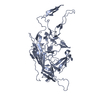
|
|---|---|
| 1 | x 60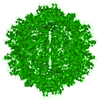
|
| 2 |
|
| 3 | x 5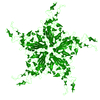
|
| 4 | x 6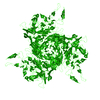
|
| 5 |
|
| Symmetry | Point symmetry: (Schoenflies symbol: I (icosahedral)) |
- Components
Components
| #1: Protein | Mass: 59205.293 Da / Num. of mol.: 1 / Mutation: A594F, Q595K Source method: isolated from a genetically manipulated source Source: (gene. exp.)   Adeno-associated virus 9 / Gene: cap / Cell line (production host): HEK293 / Production host: Adeno-associated virus 9 / Gene: cap / Cell line (production host): HEK293 / Production host:  Homo sapiens (human) / References: UniProt: Q6JC40 Homo sapiens (human) / References: UniProt: Q6JC40 |
|---|---|
| Has protein modification | N |
-Experimental details
-Experiment
| Experiment | Method: ELECTRON MICROSCOPY |
|---|---|
| EM experiment | Aggregation state: PARTICLE / 3D reconstruction method: single particle reconstruction |
- Sample preparation
Sample preparation
| Component | Name: Adeno-associated virus 9 / Type: VIRUS / Entity ID: all / Source: RECOMBINANT |
|---|---|
| Source (natural) | Organism:   Adeno-associated virus 9 Adeno-associated virus 9 |
| Source (recombinant) | Organism:  Homo sapiens (human) Homo sapiens (human) |
| Details of virus | Empty: YES / Enveloped: NO / Isolate: SEROTYPE / Type: VIRION |
| Buffer solution | pH: 7.4 |
| Specimen | Embedding applied: NO / Shadowing applied: NO / Staining applied: NO / Vitrification applied: YES |
| Vitrification | Cryogen name: ETHANE |
- Electron microscopy imaging
Electron microscopy imaging
| Experimental equipment | 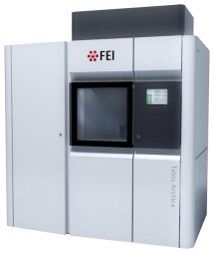 Model: Talos Arctica / Image courtesy: FEI Company |
|---|---|
| Microscopy | Model: FEI TECNAI ARCTICA |
| Electron gun | Electron source:  FIELD EMISSION GUN / Accelerating voltage: 200 kV / Illumination mode: FLOOD BEAM FIELD EMISSION GUN / Accelerating voltage: 200 kV / Illumination mode: FLOOD BEAM |
| Electron lens | Mode: BRIGHT FIELD / Nominal defocus max: 1500 nm / Nominal defocus min: 500 nm |
| Image recording | Electron dose: 35.7 e/Å2 / Film or detector model: FEI FALCON III (4k x 4k) |
- Processing
Processing
| Software | Name: PHENIX / Version: 1.18.2_3874: / Classification: refinement | ||||||||||||||||||||||||
|---|---|---|---|---|---|---|---|---|---|---|---|---|---|---|---|---|---|---|---|---|---|---|---|---|---|
| EM software | Name: PHENIX / Category: model refinement | ||||||||||||||||||||||||
| CTF correction | Type: PHASE FLIPPING AND AMPLITUDE CORRECTION | ||||||||||||||||||||||||
| 3D reconstruction | Resolution: 2.85 Å / Resolution method: FSC 0.143 CUT-OFF / Num. of particles: 17992 / Symmetry type: POINT | ||||||||||||||||||||||||
| Refine LS restraints |
|
 Movie
Movie Controller
Controller






 PDBj
PDBj
